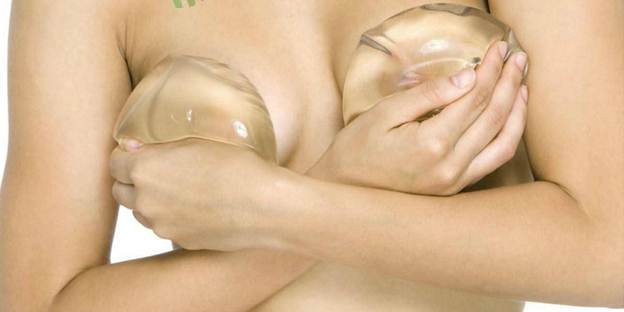Do you know what is in your breast
implants?
The safety of silicone breast implants
hit the headlines recently after Jean-Claude Mas, the 72-year-old founder of Poly
Implant Prothese (PIP) was arrested at his home in France. He is currently being
investigated for causing "involuntary harm" to women who received sub-standard
implants. His company, now defunct, was believed to have sold 400 000 implants worldwide
- including South Africa. While the current number of South African women affected
is unknown, it is believed that as many as 15 local doctors have used PIP
implants. Investigations have revealed that the implants were made from industrial
standard, rather than medical standard, silicone and had a higher risk of rupturing.
If the industrial silicone leaked into the surrounding tissue, it caused
inflammation, pain and redness.

“Prior
to 1963, experimental methods of breast enlargement attempted by physicians,
included injections of paraffin or liquid silicone and the insertion of
sponges”
However, for those in the industry, this
wasn't news. It was simply a ticking bomb waiting to explode. According to Sky
News, a Los Angeles consultant plastic surgeon, Dr Grant Stevens, documented his
concerns regarding PIP as far back as 2005. A case study he conducted, comparing
500 PIP implants with 500 alternative implants, found that the PIP implants were
three-and-a-half times more likely to rupture than the test group. Stevens
claimed that PIP asked him not to report his findings. However, in 2006, PIP received
notification from their insurers accusing them of concealing complaints about the
implants from surgeons and clinics. The letter claims PIP failed to notify them
or French regulators of incidents which would necessitate the removal of the implants,
despite it being necessary to do so. This was just one of several warnings. In
March 2000, US regulators found eleven deviations from "good manufacturing
practices", while in February 2009, the UK regulatory authority was warned
of a number of medical claims against the company. And, a lawyer, Paul Balen, who
was interviewed by Sky News, said that it was "common knowledge" in
the cosmetic surgery industry that the PIP implants were inferior. According to
Chris Snijman, a plastic surgeon and the national secretary of the Association
of Plastic and Reconstructive Surgeons of South Africa, (APRSSA), they have identified
between 11 and 15 surgeons who they believe have used PIP implants. Snijman
says that PIP implants were available in South Africa between 1995 and 2009. He
explains that prior to 2006, the implants had been manufactured under the
European Standards and contained the CE mark. "We thought that they were
okay. It was only afterwards, when reports started filtering through, that these
looked like they could be fundamentally flawed and could rupture quicker than
normal." The decision was then made to stop using the product in South
Africa.
“Investigations
have revealed that the implants were made from industrial standard, rather than
medical standard, silicone”
However, there seems to be a
three-year period between 2006 and 2009 when the potentially sub-standard product
might have been available in South Africa.
Snijman says the silicone in PIP
products are considered industrial, or second-grade silicone, rather than
medical grade. "If it ruptures, it leaks and causes a local reaction. There
is an inflammatory response resulting in a painful, lumpy, distorted breast
that is red and inflamed. There is also a propensity for the silicone to
migrate into the regional lymphatic system and, in this case, surgery will be
necessary."
The problem is that the association
does not know exactly how many South African women are affected by these
implants. Snijman says that some of their members may be a little embarrassed
to admit that they chose a cheaper option, which is causing a bit of a panic. "We
suspect that one surgeon has implanted around 300 pairs of PIP implants."
And, because the original supplier is
now defunct, there is no recourse for the surgeon. "We recommend that our
members contact all their patients who have PIP implants and request them to come
in for a clinical examination. Should the implants have ruptured, the solution
is easy - the implants have to come out. We have recommended that our members negotiate
with their patients, to preserve their good name and show that they are not in this
for the money." Snijman suggests that surgeons don't charge for the procedure,
and try to negotiate with the hospital group they work with, as well as
negotiate a fee on the replacement implants.
However, he says, doctors are faced
with an ethical dilemma. If the PIP implants don't show signs of rupture - do
you take them out, or do you just sit and watch? "This is a difficult situation
- it's like sitting on a time bomb," he cautions.
“We
have recommended that our members negotiate with their patients, to preserve
their good name and show that they are not in this for the money”
A letter, drafted by the Association of
Plastic and Reconstructive Surgeons of South Africa to its members on 16 of
January, adds that in the absence of clinical symptoms of rupture, patients should
not be advised to remove the implants, but should rather have regular follow up
examinations and yearly sonar appraisals. However, as Snijman said, should there
be the presence of clinical symptoms of possible rupture, there should be confirmation
of this by an ultrasonographicappraisal of the implants. In the case of rupture,
the implants will need to be removed, and the patient given the option of reimplantation,
removal alone, or removal with "mastopexy in the scenario or redundant
skin and ptosis [droopiness] post explantation."
Doctors
are faced with an ethical dilemma. If the PIP implants don't show signs of
rupture-do you take them out or do you just sit and watch?'